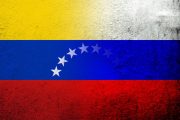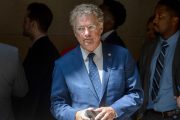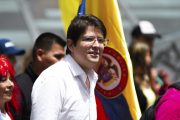Under the guise of supposed emergencies, outgoing “lame-duck” Venezuelan legislators voted overwhelmingly on December 17 to give socialist President Hugo Chavez dictatorial powers to rule by decree for the next year and a half in a bill being referred to as the “enabling law.”
Though Chavez had requested only a year of supreme and unchallenged authority, the National Assembly decided to give him 18 months. Assembly boss Cilia Flores of Chavez’s United Socialist Party of Venezuela said the move illustrated legislators’ “revolutionary commitment.”
Newly elected opposition members will be seated in the Assembly in less than three weeks, so it was important for the regime to pass the legislation before anti-Chavez legislators had a chance to weigh in. Even though the opposition will only control about a third of the Assembly — despite winning more than half of the popular vote in September — that would have been enough to slow Chavez’s tyrannical ambitions by stopping certain types of important legislation.
Venezuelan opposition parties made impressive gains in this year’s national election by uniting against Chavez’s totalitarian agenda, despite the regime’s propaganda apparatus working overtime and the blatantly gerrymandered districts favoring Chavez’s party. But right now, the opposition has virtually no representation in the National Assembly due to a boycott of the “illegitimate” 2005 election.
But the recent advances will not mean much after Friday’s vote, and Chavez knows it. He even took to the airwaves to ridicule his opposition.
“You won’t be able to make even a single law, little Yankees,” he taunted, condescendingly referring to his opponents as pawns of the U.S. empire. “We’re going to see how you make laws now.” The rule-by-decree powers expire about six months before the next presidential election in 2012.
The official excuse for the vast new powers was a recent deluge — Chavez blamed the rains on “capitalism” — that washed away shanty towns and devastated certain agricultural areas. But the new act allows Chavez to exert virtually total control over everything from military, taxes, banking and communications to the “socioeconomic” system and land-use policies.
And Chavez already has big plans for his new powers. Before the legislation was even approved, he told supporters that he had at least 20 decrees ready to go. First up, an increase in the so-called “Value-Added Tax,” or VAT, for short. He plans to implement new “social responsibility” requirements for the media, too.
Also on the outgoing lame-duck Assembly’s agenda is new legislation to tighten control of the internet. Even private messaging services and small websites would be regulated to ensure that nobody offends, ignores or disrespects “the authorities.” Causing “anxiety” among the population would also be restricted, as would human-rights groups operating in Venezuela.
The same day as the enabling act was passed, another bill allowing even more government intervention in the banking sector was approved as well. And Chavez’s Agriculture Ministry began a massive new land-grabbing program that, to start with, will gobble up almost 100 square miles of private property “for the people.”
Wearing a pistol on his belt and a shirt featuring the image of communist mass-murdered Ernesto “Che” Guevara, Venezuelan agriculture boss Juan Carlos Loyo boasted that he would “rescue” and “liberate” the best lands for “our people.” He told soldiers and bureaucrats that they were part of “an army, of a collective” on a mission to “free” the territory from its illegitimate owners.
The U.S. State Department, the Organization of American States, and countless non-profit groups have condemned Chavez’s “autocratic” power grabs and the increasingly oppressive nature of the Venezuelan regime. His native critics and opposition parties have sounded the alarm, too. But Chavez simply brushes it off, saying “the empire” is just trying to stop his glorious “Bolivarian Revolution.”
Business Monitor International, which analyzes political and economic risks across emerging markets, warned that the consequences of Chavez’s new powers could be disastrous over the long term. The opposition coalition “will be unable to alter an increasingly radical policy trajectory,” it forecasted. “This not only has negative implications for democratic legitimacy, but it also increases the threat of major political upheaval in 2012.”
Chavez has become increasingly authoritarian through his 12-year reign, eventually shutting down critical media outlets, jailing judges and journalists, arresting dissidents on trumped up charges, and nationalizing vast swaths of the nation’s crumbling economy. And the regime’s actions have started to take a heavy toll: Venezuela’s standard of living continues to plummet as inflation soars out of control and capital and skilled labor rush for the exits.
But Chavez should not be considered an anomaly among Latin American rulers, even if he is more openly oppressive and narcissistic. In fact, a powerful coalition which includes the ruling regimes of most countries in the region — as well as Marxist narco-terrorists and other unsavory leftist groups — has been steadily advancing socialist “revolution” for decades.
Founded by Cuba’s communist despot Fidel Castro, the Sandinistas, and Brazilian President Luiz Inacio “Lula” da Silva, the Foro de São Paolo (São Paolo Forum) has become a force to be reckoned with. Using Chavez’s petrodollars, drug money, as well as help from Russia, communist China, and even various statist European groups, the nefarious network has taken over close to two thirds of all Latin American governments — so far. And though the Forum has suffered some serious losses in recent elections, current trends indicate that the movement will — like Chavez — continue to expand its power while crushing liberty and destroying the economy in the process.
Photo: Venezuela’s President Hugo Chavez speaks with journalists upon his arrival at the Fort Tiuna military base to welcome Ecuador’s President Rafael Correa in Caracas, Venezuela, Dec. 14, 2010: AP Images




